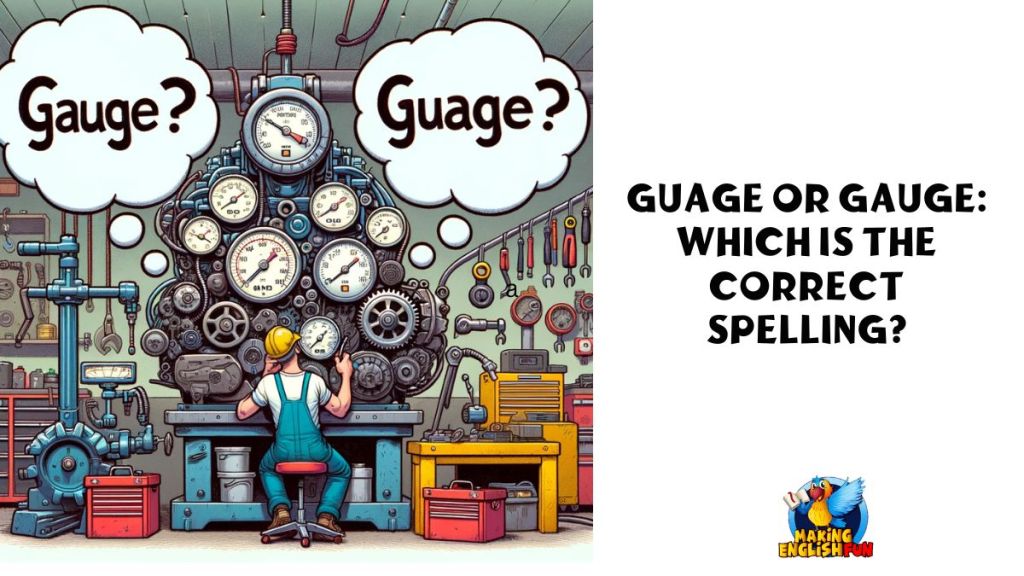Gauge or Guage: Which is the Correct Spelling?
In English, accurately spelling certain words can be particularly challenging, especially when it comes to terms with unusual vowel combinations.
The words “Gauge” and “Guage” are a prime example of this confusion. This mix-up often stems from uncertainties in pronunciation and the exceptions to English spelling rules.
The term “gauge” is commonly used in various contexts, from engineering and science to everyday language.

This article aims to clarify the correct spelling of “gauge” and provide guidance to help you remember and use it correctly, whether you’re referring to measuring instruments, assessing situations, or describing the thickness of materials.
Correct Spelling and Definition
The correct spelling is “Gauge,” with ‘au’ following the ‘g’.
“Gauge” refers to a measuring device used to determine the size, amount, or degree of something.
It can also mean the act of estimating or assessing a situation. For example, “The technician used a gauge to measure the pressure.”
Common Spelling Error: Guage
The incorrect spelling “Guage,” with ‘u’ before ‘a’, is a frequent mistake. This error might stem from an incorrect phonetic interpretation of the word.
However, the historically and technically accurate spelling is “Gauge,” following the specific ‘au’ vowel combination.
Comparison with Other Common Spelling Confusions
Similar to “Gauge,” other words in English often get misspelled due to unconventional vowel arrangements.
Here’s a comparison table showcasing some common spelling challenges:
| Correct Spelling | Common Incorrect Spelling |
|---|---|
| Gauge | Guage |
| Rhythm | Rythm |
| Liaison | Liasion |
| Occasionally | Ocassionally |
| Accommodate | Accomodate |
This table emphasizes the importance of recognizing and memorizing the correct spellings of frequently used but often misspelled words.
Etymology and Historical Development
The word “Gauge” comes from the Old Northern French word “gauger,” which means “to measure.”
It is related to the Late Latin word “gallicare,” meaning “to measure with a rod.”
The spelling with ‘au’ in “Gauge” has been consistent through its history, reflecting its origin and evolution in the English language.
Usage in Different Contexts
“Gauge” is used in various fields and contexts.
- In engineering, it might refer to instruments measuring pressure, depth, or thickness.
- In everyday language, it can mean assessing or estimating, as in “gauging someone’s reaction.”
Understanding the correct spelling of “gauge” in these contexts is important for clear and precise communication.
Tips for Remembering the Correct Spelling
Remembering the spelling of “Gauge” can be easier when associating it with its function of measurement.
The ‘au’ in “Gauge” can be thought of as representing the word ‘audit’ in the sense of assessing or measuring.
Additionally, encountering the word in technical literature or during practical applications can reinforce the correct spelling.
Conclusion
Mastering the spelling of “Gauge” is crucial for effective communication in technical, professional, and everyday settings.
Accurate spelling not only ensures clarity but also reflects a good understanding of the language and the specific contexts in which this term is used.
FAQs and Reader Questions
- Why is correct spelling important in technical terms like ‘Gauge’?
- In technical contexts, correct spelling is crucial for precision, clarity, and avoiding misunderstandings, especially in scientific measurements and descriptions.
- Are there mnemonic devices to help remember spellings of complex words?
- Yes, creating mnemonic devices that associate the word with its meaning or a related concept can aid in remembering the correct spelling.
- How can I improve my spelling in English?
- Regular reading, writing, and using spelling tools or apps can improve spelling. Additionally, engaging in language learning activities and quizzes can be beneficial.
- Do English speakers commonly misspell words like ‘Gauge’?
- Yes, words like ‘Gauge’ are commonly misspelled, even by native speakers, due to their unconventional spelling patterns.
- Can digital spell-checkers always be relied upon for correct spelling?
- While digital spell-checkers are helpful, they are not infallible. It’s important to learn and understand the rules and patterns of spelling for accurate usage.
Further Resources
- https://www.merriam-webster.com/dictionary/gauge
- https://writingexplained.org/gage-vs-gauge-difference
- https://www.techtarget.com/whatis/feature/Which-is-correct-guage-or-gauge






